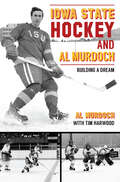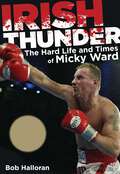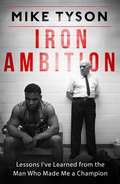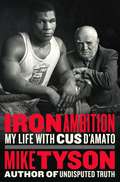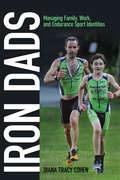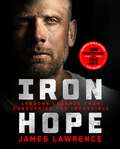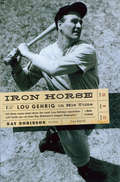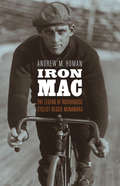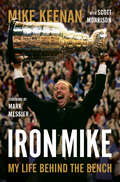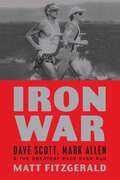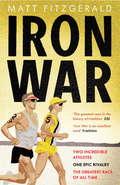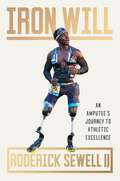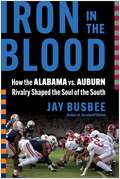- Table View
- List View
Iowa State Hockey and Al Murdoch: Building a Dream (Sports)
by Alan Murdoch Tim HarwoodThe Making of Iowa State Hockey During five decades, Alan Murdoch played for, coached and managed the Iowa State Cyclone hockey team, making a life's work out of his personal resourcefulness and initiative. Iowa State grew into a premier program in non-scholarship hockey, and as the network of similar teams became increasingly formalized under the auspices of the American Collegiate Hockey Association - an organization to which Murdoch was an essential contributor - the Cyclones played at a national championship-level. The trophy for which they were vying: the Murdoch Cup. By the time he left the bench, Murdoch's teams had won more than 1,000 games against opponents from around the world. Sometimes funny, sometime emotional, Murdoch and author Tim Harwood explore the story of how winning became a way of life for Cyclone Hockey.
Ira Gruber's Atlantic Salmon Flies
by Ira D. GruberIra W. Gruber is celebrated for the Atlantic salmon fishing techniques he developed over a lifetime of fishing on the Miramichi in New Brunswick, Canada. Ira is known for the 38 salmon fly patterns he originated and the thousands of salmon flies he tied over his lifetime, influencing such well-known contemporaries as Joe Bates, Morris Greene, Ted Niemeyer, and Leonard Wright.Ira D. Gruber, grandson of Ira W., has authored this fishing biography. A professor of history at Rice before he retired, Ira D. Gruber did the research for the book using his grandfather&’s papers, annotated angling books, photographs, and notes and interviewing locals in New Brunswick and Ira W.&’s native Pennsylvania. The book features stunning photographs of and the patterns for 91 flies from Ira W.&’s personal collection, including most of his 38 original fly creations.
Irish Coffee: A Mystery Set at the University of Notre Dame (Roger and Philip Knight Mysteries)
by Ralph McInerny“Snappy dialogue touched with humor propels the plot” of this mystery set against the exciting backdrop of Notre Dame basketball season (Publishers Weekly).When Fred Neville of the Notre Dame athletic department winds up dead under mysterious circumstances, amateur sleuth and academic Roger Knight, and his brother, Phil, a P.I., investigate the apparent murder. The trouble: no suspects. No suspects, that is, until the day of Fred's funeral, when several likely candidates suddenly appear at the poor man's wake.First, Mary Schuster, daughter of a faculty widow, shows up at the event dressed all in black, with the startling announcement that she and the deceased were secretly in love. Then the controversy doubles when another woman arrives with a huge diamond ring on her finger, claiming to have been Fred's intended. Could it be that unassuming Fred Neville was actually involved with two women, in secret and at the same time? Roger thinks not, and finds a notable piece of evidence to back up his hunch when a secret stash of Fred's poetry turns up, clearly written with a single woman in mind. Unfortunately, the object of Fred's intense love remains unnamed in his verse. Suddenly, both women are suspects in a vicious crime. But it's up to Roger to plug into the campus gossip grid and, with a little help from Phil, not to mention his vast knowledge of just about everything that happens on campus, determine the exact chain of events that led to murder.“[The] Knight brothers are a modern Nero Wolfe and Archie Goodwin who manage to poke gentle fun at the insularity of the university while solving the crime.” —Booklist
Irish Thunder: The Hard Life and Times of Micky Ward
by Bob HalloranThe story behind the Major Motion Picture The Fighter, starring Mark Wahlberg and Christian Bale, Irish Thunder is about a boxer from a boxing family and a boxing town, but it is not a boxing book. It is about the human spirit, blind loyalty, self-preservation and self-destruction. Micky’s dramatic victories inside the ring are recounted in detail, but it is his victory outside the ring that will leave the reader inspired.
Iron Ambition: Lessons I've Learned from the Man Who Made Me a Champion
by Larry Sloman Mike TysonThe story of the relationship between the most devastating heavyweight boxer in history and the mentor who made him.When legendary boxing trainer Cus D'Amato saw thirteen-year-old Mike Tyson spar in the ring, he proclaimed 'That's the heavyweight champion of the world'. D'Amato played a huge role in Tyson's formative years, legally adopting him at age sixteen, and shaping him both physically and mentally after years of living in poverty. He would train the young boxer for several years, dying just months before Tyson became the youngest heavyweight champion in history.In Iron Ambition, Tyson shares the life lessons that D'Amato passed down to him and reflects on how the trainer's words of wisdom continue to resonate with him outside the ring. The book also chronicles Cus's courageous fight against the mobsters who controlled boxing, revealing more than we've ever know about this singular cultural figure.
Iron Ambition: My Life with Cus D'Amato
by Larry Sloman Mike Tyson"[Iron Ambition] spells out D'Amato's techniques for building a champion from scratch." – Wall Street JournalFrom the former heavyweight champion and New York Times–bestselling author comes a powerful look at the life and leadership lessons of Cus D’Amato, the legendary boxing trainer and Mike Tyson’s surrogate father. When Cus D’Amato first saw thirteen-year-old Mike Tyson spar in the ring, he proclaimed, “That’s the heavyweight champion of the world.” D’Amato, who had previously managed the careers of world champions Floyd Patterson and José Torres, would go on to train the young Tyson and raise him as a son. D'Amato died a year before Tyson became the youngest heavyweight champion in history. In Tyson’s bestselling memoir Undisputed Truth, he recounted the role D’Amato played in his formative years, adopting him at age sixteen after his mother died and shaping him both physically and mentally after Tyson had spent years living in fear and poverty. In Iron Ambition, Tyson elaborates on the life lessons that D’Amato passed down to him, and reflects on how the trainer’s words of wisdom continue to resonate with him outside the ring. The book also chronicles Cus’s courageous fight against the mobsters who controlled boxing, revealing more than we’ve ever known about this singular cultural figure.
Iron Dads: Managing Family, Work, and Endurance Sport Identities
by Diana Tracy CohenAmong the most difficult athletic events a person can attempt, the iron-distance triathlon--a 140.6 mile competition--requires an intense prerace training program. This preparation can be as much as twenty hours per week for a full year leading up to a race. In Iron Dads, Diana Tracy Cohen focuses on the pressures this extensive preparation can place on families, exploring the ways in which men with full-time jobs, one or more children, and other responsibilities fit this level of training into their lives. An accomplished triathlete as well as a trained social scientist, Cohen offers much insight into the effects of endurance-sport training on family, parenting, and the sense of self. She conducted in-depth interviews with forty-seven iron-distance competitors and three prominent men in the race industry, and analyzed triathlon blog postings made by Iron Dads. What sacrifices, Cohen asks, are required--both at home and at work--to cross the iron-distance finish line? What happens when work, family, and sport collide? Is it possible for fathers to meet their own parenting expectations while pursuing such a time-consuming regimen? With the tensions of family economics, how do you justify spending $5,000 on a racing bike? At what point does sport become work? Cohen discovered that, by fostering family involvement in this all-consuming effort, Iron Dads are able to maintain a sense of themselves not only as strong, masculine competitors, but also as engaged fathers. Engagingly written and well researched, Iron Dads provides a penetrating, firsthand look at extreme endurance sports, including practical advice for aspiring racers and suggestions for making triathlons more family-friendly.
Iron Hope: Lessons Learned from Conquering the Impossible
by James LawrenceThe ultimate guide to mental toughness by James “Iron Cowboy” Lawrence—the greatest endurance athlete in human history.Lawrence’s accomplishments are nearly impossible to comprehend. After breaking two Guinness World Records, he shattered possibilities in 2015 by completing 50 full-distance triathlons in 50 states in 50 consecutive days. Yes, THE IRONMAN®, “the single most difficult day in sports”– a 2.4-mile swim, 112 miles on a bike, then a 26.2-mile run, all completed in under 17 hours. It is a race so intense that less than .01% of the population have completed one.Afterwards, Lawrence subjected his body to exhaustive physical testing, to every genetic test known to science. The stunning discovery is that physically, James Lawrence is unspecial in every way. The secret to his bulletproof body is his bulletproof mentality.Even those accomplishments weren’t enough for James. In 2021, he set out on another endurance endeavor, this one so difficult he wondered if he would even live. He set out to complete a staggering 100 full-distance triathlons in 100 consecutive days. By persevering, he wanted to inspire people to do the same for whatever difficulties they are going through.How does a person develop the mental fortitude necessary to overcome incredible exhaustion, immeasurable suffering, and unfathomable pain in order to achieve impossible goals? With Iron Hope, that’s exactly what James “Iron Cowboy” Lawrence shows readers how to do. Lawrence explains how readers can forge an iron will by making and keeping small promises to themselves again and again, amassing experience and building momentum until giving up becomes impossible. Combine a big dream with small improvements repeated with great consistency and make your goals and dreams a reality.
Iron Horse: Lou Gehrig in His Time
by Ray Robinson"All these many years down the road, Lou Gehrig's reputation still holds up as does Ray Robinson's elegant biography." -Bob Costas Lou Gehrig will go down in history as one of the best ballplayers of all time; he was elected to the Hall of Fame and played in a record-setting 2,130 consecutive games. ALSknown today as "Lou Gehrig's Disease"robbed him of his physical skills at a relatively young age, and he died in 1941. Ray Robinson re-creates the life of this legendary ballplayer and also provides an insightful look at baseball, including all the great players of that era: Babe Ruth, Ty Cobb, Walter Johnson, and more. 16 photographs.
Iron Mac: The Legend of Roughhouse Cyclist Reggie McNamara
by Andrew M. HomanAt a time when cycling in the United States rivaled baseball as the nation’s most popular professional sport, along came Reggie McNamara, a farmer’s son from Australia. Within a month of his arrival in the United States in 1913, he had earned the moniker “Iron Man” for his high tolerance of pain and his remarkable ability to recover from seemingly catastrophic injury. The nickname proved justified. Not only was he tough, he was also one of the best and highest-paid athletes in the world. During his thirty-year career, McNamara won seventeen punishing six-day races along with an inestimable number of shorter distance races, including high-profile events on three different continents, peaking in 1926–27 at the age of thirty-nine. The fans, media, and his fellow professionals all idolized him as an example of the true grit needed to succeed in this grueling and dangerous sport. Late in his career, however, hard drinking and injuries took their toll, and McNamara became estranged from his wife and children. He fought back just as he always had on the race course, conquering his addiction to alcohol and becoming one of the earliest success stories of Alcoholics Anonymous. In this humorous and exciting biography of the original Iron Man, Andrew M. Homan pulls McNamara back into the spotlight, depicting a flawed but beloved man whose success in those unrelenting six-day races came at a price.
Iron Mike: My Life Behind the Bench
by Scott Morrison Mike KeenanThe must-read memoir of one of the NHL's most controversial and successful coaches—winner of the 1994 Stanley Cup with the New York Rangers.In the fraternity of NHL coaches, some stand out for their winning records, some for their big personalities and some for their unprecedented methods. Mike Keenan stands out on all these counts, and more. Breaking into the NHL as head coach of the Philadelphia Flyers in 1984, Keenan got instant results, leading them to the Stanley Cup final in his first year. In 1987, he coached Team Canada to victory in the Canada Cup using his intuitive bench management, putting superstars Wayne Gretzky and Mario Lemieux together on a line at key times to great, winning results. Keenan&’s teams succeeded at every level. With championships in university athletics, the OHL and AHL, it seemed only a matter of time before his resumé would include the ultimate prize. One of the NHL&’s most valuable franchises, the New York Rangers, hadn&’t won a Cup in fifty-four years—the league&’s longest championship drought at the time. But with five-time Stanley Cup champion Mark Messier as captain of the star-studded Rangers lineup, there was only one thing missing for a championship run on Broadway: a coach who could focus all the talent and desire on victory. After a season of much controversy, in 1994 the Stanley Cup finally returned to Madison Square Garden, considered by many to be one of the greatest Cup wins by a US-based NHL team. In the hands of veteran sports journalist and bestselling author Scott Morrison, Iron Mike takes readers behind the scenes of one of the most explosive runs to the Cup in NHL history, one that Keenan shares at long last. There is only one Iron Mike in hockey, and love him or hate him, his memoir is an essential read for any fan of the game.
Iron Shirt Chi Kung
by Mantak ChiaAn introduction to the ancient Kung Fu practice designed to unify physical, mental, and spiritual health• Describes the unique Iron Shirt air-packing techniques that protect vital organs from injuries• Explains the rooting practice exercises necessary to stabilize and center oneself• Includes guidelines for building an Iron Shirt Chi Kung daily practiceLong before the advent of firearms, Iron Shirt Chi Kung, a form of Kung Fu, built powerful bodies able to withstand hand-to-hand combat. Even then, however, martial use was only one aspect of Iron Shirt Chi Kung, and today its other aspects remain vitally significant for anyone seeking better health, a sound mind, and spiritual growth.In Iron Shirt Chi Kung Master Mantak Chia introduces this ancient practice that strengthens the internal organs, establishes roots to the earth’s energy, and unifies physical, mental, and spiritual health. Through a unique system of breathing exercises, he demonstrates how to permanently pack concentrated air into the connective tissues (the fasciae) surrounding vital organs, making them nearly impervious to injuries--a great benefit to athletes and other performers. He shows readers how once they root themselves in the earth they can direct its gravitational and healing power throughout their bone structure. Additionally, Master Chia presents postural forms, muscle-tendon meridians, and guidelines for developing a daily practice routine. After becoming rooted and responsive, practitioners of Iron Shirt Chi Kung can then focus on higher spiritual work.
Iron War: Dave Scott, Mark Allen, and the Greatest Race Ever Run
by Matt FitzgeraldThe 1989 Ironman World Championship was the greatest race ever in endurance sports. In a spectacular duel that became known as the Iron War, the world's two strongest athletes raced side by side at world-record pace for a grueling 139 miles. Driven by one of the fiercest rivalries in triathlon, Dave Scott and Mark Allen raced shoulder to shoulder through Ironman's 2.4-mile swim, 112-mile bike race, and 26.2-mile marathon. After 8 punishing hours, both men would demolish the previous record--and cross the finish line a mere 58 seconds apart. In his new book Iron War, sports journalist Matt Fitzgerald writes a riveting epic about how Allen and Scott drove themselves and each other through the most awe-inspiring race in sports history. Iron War goes beyond the pulse-pounding race story to offer a fascinating exploration of the lives of the world's two toughest men and their unquenchable desire to succeed. Weaving an examination of mental resolve into a gripping tale of athletic adventure, Iron War is a soaring narrative of two champions and the paths that led to their stunning final showdown.
Iron War: Two Incredible Athletes. One Epic Rivalry. The Greatest Race of All Time.
by Matt FitzgeraldLonglisted for the William Hill Sports Book of the Year 2012. On October 14, 1989, driven by one of the most intense and lasting two-man rivalries in any sport, a pair of generational talents at the height of their powers ran a race that redefined human limits. The battle between Dave Scott and Mark Allen at the 13th Hawaii Ironman stands as one of the most dramatic stories in the history of athletics. The two greatest athletes of triathlon's pioneering generation raced side by side, literally, for eight straight hours at breakneck speed before Allen finally tore away from his longtime nemesis with less than two miles left in the 140.6-mile event. His margin of victory was a scant 58 seconds. So intense was the drama, the race came to be known as 'Iron War' - the single most awe-inspiring sporting event ever witnessed. More than a compelling story, Iron War is a fascinating exploration of how Scott and Allen pushed themselves and each other - and what it takes for anyone to break through perceived limits. Much as Christopher McDougall added depth to Born to Run by tying in new research on the evolutionary origins of humans as runners, Iron War shows how new discoveries in neuroscience explain how some elite athletes are able to literally will their bodies to do things that should be beyond their capacities. The book weaves an examination of the anatomy of mental toughness into a gripping tale of athletic adventure. With its emotional and intellectual depth, Iron War is a captivating and thought-provoking portrait of the human will.
Iron Will: An Amputee's Journey to Athletic Excellence
by Roderick SewellThe story of the first bilateral above-the-knee amputee to become and IRONMAN champion. Roderick Sewell II was born without the tibia in both of his legs. Before he turned two years old, his mother, Marian, made the tough choice to have his legs amputated so that he could continue wrestling with his cousins and climbing his grandmother&’s good furniture. But when Marian&’s modest income couldn&’t cover the prosthetics Roderick needed to attend school, she made another impossible decision: to leave her job so that California Children&’s Services would pay for Roderick&’s prosthetic legs. Roderick and his mother were left homeless, keeping their long stays in shelters a secret while he learned to swim at the YMCA. All the while, Marian instilled in Roderick the lessons of gratitude, love, and patience to build his confidence in his disability, his identity as a Black boy, and his true passion, sports. Roderick was still homeless when he met coaches from the Challenged Athletes Foundation. They gave him his running legs, and his life quickly changed for the better. He learned how to challenge his body to become a fierce competitor and athlete—with his mom cheering from the sidelines all the while.Iron Will is the story of an athlete with an indomitable spirit and proof that a winner&’s mindset is about more than physical and mental endurance. It&’s about the unique places you can find love, and the rewards of conquering your fears.
Iron Yoga: Combine Yoga and Strength Training for Weight Loss and Total Body Fitness
by Eric Neuhaus Anthony CarilloBodysculpting meets yoga in this revolutionary workout from Ironman triathlete Anthony Carillo. Learn to combine yoga poses with upper-body work for super-fast results.Add more power to your yoga routine! Developed by Anthony Carillo when he was training for the "super bowl" of triathlons, the Ironman World Championship, the Iron Yoga method has quickly become one of the hottest fitness routines on the East Coast, and Carillo's innovative approach was featured in Men's Journal, Yoga, Fitness, Men's Fitness, Elle, and on CNN.Iron Yoga's novel full-body workout lets you reap the benefits of both yoga and weight training. While practicing over 25 of your favorite yoga asanas, you'll incorporate light to moderate dumbbells to work the arms, shoulders, chest, back, and core. Every exercise for the upper body is performed slowly in conjunction with the rhythmic flow of yoga breath, which provides a superior burn. Throughout the book, 125 photographs clearly demonstrate the proper form for each pose. The result is a body shaping, toning, and sculpting routine that increases lean muscle mass, fires up the metabolism, assists with weight management goals, increases flexibility and range of motion, sharpens concentration skills, and enhances proper breathing techniques--calming the body and reducing stress and tension. You can't find this completely original workout anywhere else.
Iron in the Blood: How the Alabama vs. Auburn Rivalry Shaped the Soul of the South
by Jay Busbee"A football history that's both detailed and panoramic. As expected for a football book, Busbee offers a generous serving of play-by-play, game-by-game, fight song, and mascot details, but in a well-organized structure and smoothly flowing text.&” —Booklist The story of college football in Alabama is the story of the South itself. This behind-the-scenes account of the Alabama vs. Auburn rivalry, one of the fiercest in American sports, details its rich history, celebrates the triumphs of both teams, and showcases the larger-than-life power of football to break down barriers and shape an entire culture. For Alabama and Auburn, football isn&’t life. It&’s much more important than that. Their rivalry is a multigenerational one, fueled by rage and redemption, and they clash every autumn with ferocity and defiance. But the shockwaves of their feud have transcended the football field, entering into politics, advancing civil rights, energizing millions, and opening up eyes and hearts in a way even religion never could. Yahoo Sports senior writer Jay Busbee traces the perpetual impact of football in Alabama, from the days of Reconstruction, through the Civil Rights era, to the hyper-partisan climate of the 2020s. From Bear to Bo, from Cam to Nick, from Toomer&’s Corner to Denny Chimes, Iron in the Blood revels in the victories of both schools and dives deep into the iconic figures connected with both programs. Iron in the Blood is an up-close look at one of America&’s most colorful sports rivalries, but it&’s also a glimpse into the joy and agony of being a die-hard football fan. It&’s the dramatic history of how football has defined a state, inside and outside its stadiums. And it&’s the story of how Alabama understands that football is both a magnificent way to celebrate its brightest days and a welcome path to climb out of its darkest ones.
IronFit Secrets for Half Iron-Distance Triathlon Success: Time-Efficient Training for Triathlon's Most Popular Distance
by Melanie Fink Don FinkWhy is the Half Iron-Distance the most popular triathlon distance? Because it is the perfect length for busy athletes with demanding career and family responsibilities. Full Iron-Distance races require such painstaking planning and sacrifice that it’s difficult to keep life in balance. The Half Iron-Distance is accessible, while remaining challenging. Also known as the “70.3” for the sum of its 1.2 mile swim, 56 mile bike ride, and 13.1 mile run, the half-iron triathlon is not simply a race for which an athlete can use a full-iron training regimen chopped in half. Doing so would in no way approach maximizing an athlete’s performance. The races are performed at completely different intensity levels, with completely different approaches. As a result, the training is completely different. IronFit Secrets to Half Iron-Distance Triathlon Success does for the half-iron what Be IronFit has done for the full-iron. It provides three sixteen-week training programs—Competitive, Intermediate, and “Just Finish”—and details everything an athlete needs to know to successfully prepare for and maximize performance at this racing distance. In as little as four months, any athlete can be physically and mentally ready for the world’s most popular triathlon challenge.
IronFit Strength Training and Nutrition for Endurance Athletes: Time Efficient Training Secrets for Breakthrough Fitness
by Melanie Fink Don FinkFully illustrated with depictions of proper exercise technique, this book contains exciting strength training programs based on sport (e.g., triathlon, running, cycling, swimming) and levels from beginner to advanced. For the marathon runner, triathlete, duathlete, distance swimmer, or cyclist, these programs will complement any other training regimen an athlete follows. Written without confusing jargon, IronFit® Stregth Training… provides concise and easy-to-follow information. Don and Melanie Fink of IronFit® have coached hundreds of athletes over several decades at all levels, from weekend warriors to world champions. Their innovative approaches to strength training and nutrition not only complement an athlete’s sport-specific training, but they do so in the most time-efficient and enjoyable way possible. Multi-sport and multi-leveled, this book provides 27 specific program schedules – 9 sports and 3 levels each to give readers: 1) A progressive strength and core training program for their specific sport and level. 2) A mind and body preparation program to maximize benefits. 3) A traveling strength and core program for travel with little or no equipment. 4) A fueling and hydration routine to maximize performance before, during, and after competition. 5) A healthy eating and lifestyle plan.
IronFit Triathlon Training for Women: Training Programs and Secrets for Success in all Triathlon Distances
by Melanie Fink Don FinkProviding exactly what the fastest growing segment of the triathlon world yearns for, Melanie and Don Fink have created a complete training guide for women triathletes with highly efficient, easy-to-follow, multi-distance training programs. Women encounter all the same challenges as men in their triathlon training and racing, but there are a host of issues unique to them, issues about which most men don&’t have a clue. From the stay-at-home mom to the professional woman, female triathletes face societal expectations, and unique physical and emotional concerns. Until now, there has been never been a go-to source of information and guidance. IronFit Triathlon Training for Women arms the woman triathlete with everything she needs to know to persevere and lays out exact step-by-step training programs to help her to achieve her goals. This book includes three training programs designed for women at the Sprint/Standard (a/k/a "Olympic") Distance, Half Iron-Distance, and Full Iron-Distance. Each program is presented at three levels: Competitive, Intermediate, and "Just-Finish." The reader can select the program for the race distance she wants to train for and the exact level, based on her individual competitiveness, experience, and available training time.
IronFit's Everyman Triathlons: Time-Efficient Training for Short Course Triathlons
by Melanie Fink Don FinkCompleting IronFit&’s &“triathlon trilogy&” alongside Be IronFit and IronFit Secrets for Half Iron-Distance Success, this is a &“go-to,&” time-efficient training guide for the Standard and Sprint-distance triathlons, which are the most accessible and achievable distances for time-crunched athletes. The Standard Distance is the original triathlon configuration: a 1.5 km swim, 40 km bike, and 10 km run (0.9 mile swim, 24.8 mile bike, and 6.2 mile run). The Sprint Distance usually includes a 750 meter swim, 20 km bike, and 5 km run (Half mile swim, 12.4 mile bike, and 3.1 mile run). And there are duathlon equivalents of both triathlon races. These Short Course distances are the &“everyman&” races of the sport, and Don and Melanie Fink offer their time-efficient IronFit® training approach to them here in this book.
IronFit's Marathons after 40: Smarter Training for the Ageless Athlete
by Melanie Fink Don FinkThe only marathon training guide athletes forty and older will ever need Updated with full-color exercise photography; cutting-edge training, strength, core, and flexibility programs; and specific instruction for the most popular version of the marathon, the Half-Marathon, this book starts with s simple premise: training methods for younger athletes no longer work for athletes over forty. Melanie and Don Fink present step-by-step action plans for faster times, fewer injuries, and more enjoyment for the Master&’s marathoner. Including profiles of successful older athletes, this book also provides ways to avoid common training and racing mistakes, recovery methods unique to forty-plus athletes, secrets to staying injury-free, and much more.
Irongran: How keeping fit taught me that growing older needn't mean slowing down
by Edwina Brocklesby'If I can start to run at 50 and become the oldest British woman to complete an Ironman, everyone should realise it's never too late'At the age of 50, Eddie Brocklesby decided to run her first half marathon. Until that point, she'd done little running, and her exercise regime consisted of little more than chauffeuring her children to their own sports clubs. In common with so many people, any interest she'd shown in sport in her childhood had diminished as her adult life progressed, with spare time becoming ever more limited in the face of work and family commitments.After that event, and following the loss of her husband of thirty years to cancer, she completed a marathon. Now, 75 years old, the past twenty years has seen Eddie take part in marathons, triathlons and Ironman races across the globe and she has accrued many medals and awards.In Irongran, Eddie looks back on her life and explains just how she's managed to develop the energy to match the enthusiasm she's always had for an active lifestyle. She shares the difficulties she's experienced in her sporting endeavours, and explains how she's managed to overcome them. Eddie is passionate about the health and wellbeing of our ageing population and provides up to date research about why keeping active in later years is so important, along with guidance about how to remain full of life in your later years.
Irongran: How keeping fit taught me that growing older neednt mean slowing down
by Edwina Brocklesby'If I can start to run at 50 and become the oldest British woman to complete an Ironman, everyone should realise it's never too late'At the age of 50, Eddie Brocklesby decided to run her first half marathon. Until that point, she'd done little running, and her exercise regime consisted of little more than chauffeuring her children to their own sports clubs. In common with so many people, any interest she'd shown in sport in her childhood had diminished as her adult life progressed, with spare time becoming ever more limited in the face of work and family commitments.After that event, and following the loss of her husband of thirty years to cancer, she completed a marathon. Now, 75 years old, the past twenty years has seen Eddie take part in marathons, triathlons and Ironman races across the globe and she has accrued many medals and awards.In Irongran, Eddie looks back on her life and explains just how she's managed to develop the energy to match the enthusiasm she's always had for an active lifestyle. She shares the difficulties she's experienced in her sporting endeavours, and explains how she's managed to overcome them. Eddie is passionate about the health and wellbeing of our ageing population and provides up to date research about why keeping active in later years is so important, along with guidance about how to remain full of life in your later years.
Ironman
by Chris CrutcherBo Brewster has been at war with his father for as long as he can remember. Following angry outbursts at his football coach and English teacher that have cost him his spot on the football team and moved him dangerously close to expulsion from school, he turns to the only adult he believes will listen: Larry King. In his letters to Larry, Bo describes his quest for excellence on his own terms. No more coaches for me, he tells the talk show icon, no more dads. I'm going to be a triathlete, an Ironman. Relegated to Mr. Nak's before-school Anger Management group (which he initially believes to be populated with future serial killers and freeway snipers), Bo meets a hard-edged, down-on-their-luck pack of survivors with stainless steel shields against the world that Bo comes to see are not so different from his own. It is here he meets and falls in love with Shelly, a future American Gladiator, whose passion for physical challenge more than matches his. Ironman is a funny, sometimes heartbreaking story about growing up in the heart of struggle. It is about standing up, getting knocked down, and standing up again. It is about being heard--and learning to listen.
